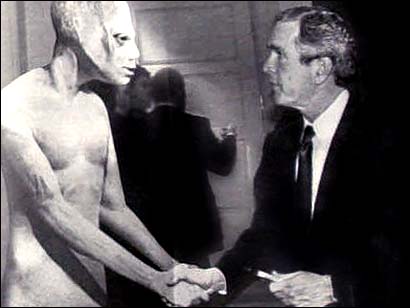Bush's visit to Britain exposes deep division
Philip Bowring | 18.11.2003 09:56 | Bush 2003

The second is perhaps more significant: the gap between the public view of the United States in general and of Bush in particular. Across the spectrum in Britain is a willingness to give America the benefit of the doubt on most issues, be they the merits of McDonald's, the dollar or even California politics. Knee-jerk anti-Americanism exists but is balanced by knee-jerk pro-Americanism and shared anti-French sentiment. But it is hard to find even the most pro-American voices enthusing about the persona of President Bush, or the wisdom of this visit at this time .
This partly stems from a widespread perception that Bush lacks the stature that Britons expect from a U.S. president, a quality that they mostly perceived, rightly or not, in Bill Clinton and Ronald Reagan. Nor is he credited with the intelligent seriousness of purpose attributed to George Bush Sr. and Jimmy Carter.
It also partly stems from Britons' sense of humiliation at their own weakness. The country that had given political support to the United States at the time of the Vietnam War but had resolutely declined to take part had now followed Bush's Iraq agenda to the letter. Most Britons believe that Blair deserves the "poodle" jibe, but they can only blame themselves, not Bush, for this.
To underline the Blair government's perceived subservience to the Bush White House, unprecedented measures are being put in place to keep out of Bush's sight and hearing the massive demonstrations that are sure to greet his visit. A large area in the vicinity of the Houses of Parliament and Buckingham Palace is to be barred to demonstrators, and 5,000 police will be on hand. This is allegedly being done on the grounds of security.
In the lead up to the visit, all kinds of alarmist statements have been made about the risk of a terrorist attack this week, but such risk may well be no higher than last week. Smart terrorists strike when least expected. Local feelings have been further ruffled by media reports that the White House has been demanding measures more appropriate for Baghdad than central London.
It may be important for Bush's re-election campaign to be seen to get a warm reception in the one country that has stuck by the United States on its Iraq venture. But many see an affront to the robust traditions of the United States as well as Britain if the rules of the game have to be changed to accommodate demands made in the name of security. Blair has not helped with an aggressive speech equating opposition to the visit as anti-Americanism rather than the anti-Iraq war sentiment that demonstration organizers claim.
This visit is likely to be a reminder to Britons of today's divisions over Iraq, and of their own blind following of Bush, rather than a celebration of the ties that bind the two nations.
Philip Bowring
 Homepage:
http://www.iht.com/articles/117941.html
Homepage:
http://www.iht.com/articles/117941.html
Comments
Display the following 3 comments